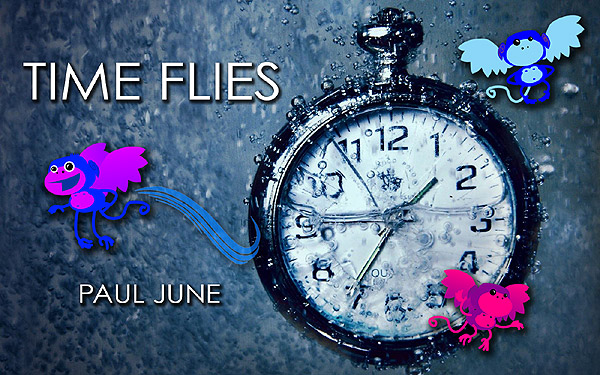They say time flies when you’re having fun. And for me, 2014 has been a blast.
On the personal front, I got engaged, got married, and just a couple of weeks ago welcomed home baby Lee.
Professionally, I’ve been hard at work with Barrel O’ Monkeyz, helping clients build their brand stories while I’ve been refreshing my own with a new website, a fantastic new team, and renewed energy.
Even the Holidays haven’t seemed to be able to slow things down this year. Seems like Halloween just came and went and then we were on to Thanksgiving—and in just a little over two weeks it’ll be Christmas and then New Year’s, and pretty soon the first quarter will be over!
Whew. It’s almost enough to make your head spin.
Last November I explored whether or not time actually speeds up as we get older. The good news is that it doesn’t speed up—not really anyway. It’s all a matter of perception. Of course, as we marketers and entrepreneurs know, perception is reality. So while time may not actually speed up, we feel as though it speeds up as we hurry along our daily lives.
It seems that as we get older, the sheer number of events we’ve experienced over a lifetime begin to lose their distinction from one another, making the minutes, hours, and days seem to streak by in a blur.
What can we do about it? Apparently, there’s lots we can do to slow the hands of time. Here’s that blog again. It’s hard to believe more than a year has passed since I wrote it . . . Enjoy!
A Matter of Time
(Originally posted on November 13, 2013)
WOW. Is it really already mid-November? With the Thanksgiving feast looming, Turkeys everywhere are scattering.
These days it seems as though every year goes by more quickly. I guess our parents were right when they said time goes faster as you get older. Looking back at the previous 11 months—heck the last 2 or 3 years—it’s hard for me to argue with them. “2013 where did you go? I hardly knew you!”
So does time actually speed up?
Albert Einstein theorized that time is relative, and scientific observation and experiment routinely support his notion. And while Einstein was almost certainly more concerned with the physical properties of time, I’m sure he would be relieved to know that I (and others) agree with him when it comes to our perception of time as well. Its seems that’s relative, too.
When we’re young, everything is a first—first day of school, first date, first car, first job, etc.—and all of these firsts hold distinct places in our memories. Remember those summer vacations off from school, the days at the beach, biking with your best friends, playing ball? Those times seemed endless, didn’t they? Now think back to your most recent vacation. It probably seemed to come and go in a flash.
As we get older our lives get filled with more and more clutter, a series of indistinct, repetitive events and activities that fill our days and nights. Do you remember your 27th birthday? Unless you did something super special, it’s probably hard to distinguish it from your 26th or 28th . . . or even your 33rd. Time seems to get compressed between such indistinct events and we perceive the days and years as flying by.
videos from National Geographic
This past summer, the New York Times ran an article on how we experience time as we get older. It’s a fascinating and entertaining read, and a bit reassuring. No, it seems, we older folks aren’t suffering from some collective malady after all, nor are we the victims freaky time-related phenomena best discussed by quantum physicists or fodder for the latest Sci Fi Channel movie of the week.
Studies cited in the article found several distinct reasons for why young and old perceive the passage of time differently:
- Our emotionsaffect how we perceive time. When we are afraid or fearful, time seems to pass more slowly. Makes sense, doesn’t it? As kids, more than likely we experienced a lot of our firsts with a bit of anxiety. Even now, the good times always seem to fly by, while the bad ones seem to take forever.
- Attention and memoryalso play a big part in how we perceive time. To gauge time accurately requires the ability to focus and remember, so it stands to reason that as our lives get more hectic as adults—well, the days seem to pass in a blur.
- Similarly, as the mental demandsof tasks grow, we perceive the duration of those tasks to be longer. In other words, learning new things—and when we are youngsters everything is new—slows down our internal sense of time. As we get older, we tend to do repetitive tasks—at home, at work, at play—and the days, the weeks, the years tend to run into another.
The author of the article, Richard A. Friedman, concludes that “if you want time to slow down, become a student again. Learn something that requires sustained effort; do something novel. Put down the thriller when you’re sitting on the beach and break out a book on evolutionary theory or Spanish for beginners or a how-to book on something you’ve always wanted to do. Take a new route to work; vacation at an unknown spot. And take your sweet time about it.”
Sure sounds like great advice to me!
In today’s world, when everything from entertainment to what we should think about certain issues of the day is spoon-fed to us, we really don’t pay that much attention, nor do we expend much mental energy, because we don’t have to. Our minds have become lazy and dulled . . . and time slips by faster and faster.
The real answer to slowing down the passage of time, it seems, isn’t to “stop and smell the roses,” but to start using our time more wisely:
- Do something different for the upcoming holidays.
- Learn a new skill or hobby.
- Start a new business.
- Embark on a new career.
- Go somewhere different this weekend.
- Shake things up a bit and do something that takes you out of your comfort zone.
- Make a new friend.
The possibilities are endless, while time is not. I figure I’ve only got so many days on this globe, so I aim to make the most of each tick-tock. Anyone read a good “how-to” book lately?


Trackbacks/Pingbacks